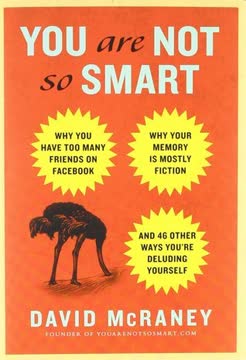Key Takeaways
1. Leadership is a series of habits, not innate traits
"No one consciously chooses to be a bad leader."
Leadership as habit. Contrary to popular belief, leadership is not an innate trait but a set of learned behaviors that become habits over time. Research shows that only 30% of leadership ability is genetic, while 70% is learned. This means anyone can develop leadership skills through deliberate practice and habit formation.
Unconscious behaviors. Many ineffective leadership behaviors are unconscious habits formed over time without awareness. For example, Laura the ER nurse didn't realize her argumentative and sarcastic behaviors were preventing her promotion. By becoming aware of these unconscious habits and deliberately practicing new behaviors, anyone can improve their leadership skills.
The power of habits. Habits are automatic behaviors triggered by specific cues, making up about 43-47% of our daily actions. By harnessing the power of habit formation, we can transform our leadership abilities with minimal conscious effort. The key is to identify the micro-behaviors that make up effective leadership skills and turn them into habits through consistent practice.
2. The Leader Habit Formula: Simple exercises for lasting change
"The Leader Habit Formula takes advantage of the power of chaining."
Simple, consistent practice. The Leader Habit Formula breaks down complex leadership skills into simple, 5-minute daily exercises focused on specific micro-behaviors. By practicing these exercises consistently, you can turn effective leadership behaviors into automatic habits.
Key components:
- Cue: A natural, embedded trigger for the behavior
- Behavior: A simple, specific action to practice
- Reward: Intrinsic satisfaction from performing the behavior
The 66-day rule. Research shows it takes an average of 66 days of consistent practice for a behavior to become a habit. The Leader Habit Formula incorporates this timeline, encouraging practitioners to commit to at least 66 days of practice for each exercise to ensure the new behavior becomes automatic.
3. Sustaining practice: Make it easy and intrinsically rewarding
"The secret to sustaining practice is to make it as easy as possible—and that's exactly what the Leader Habit Formula does."
Minimize effort. To sustain practice, it's crucial to make the exercises as easy as possible. The Leader Habit Formula uses simple, 5-minute daily exercises that can be completed even on low-motivation days.
Align with personality. Choose exercises that align with your personality traits to make them intrinsically rewarding. This increases the likelihood of consistent practice and successful habit formation.
Track progress. Use simple tracking methods like calendars, smartphone apps, or habit-tracking applications to monitor your practice. Seeing your progress increases motivation and helps sustain your efforts over time.
4. From micro-behaviors to full-blown skills through chaining
"Leadership skills are chains of micro-behaviors."
Breaking down complex skills. The Leader Habit Formula breaks down complex leadership skills into their constituent micro-behaviors. This approach makes it easier to learn and practice each component separately before combining them into a full skill.
Chaining process:
- Identify micro-behaviors that make up a skill
- Practice each micro-behavior separately
- Combine micro-behaviors to form the complete skill
Keystone habits. Some habits trigger a chain reaction of behavioral change, transforming multiple aspects of your leadership. Identifying and developing these keystone habits can accelerate your leadership development and create widespread positive changes in your behavior.
5. Identify your leadership style and personality traits
"To understand which leadership skills are intrinsically rewarding for you, look to your personality traits."
Leadership styles:
- Task-oriented: Focus on getting things done, planning, and organizing
- People-oriented: Focus on relationships, motivation, and support
Personality traits:
- Curious
- Organized
- Caring
- Outgoing
- Ambitious
- Resilient
Aligning skills with traits. Identify which leadership skills align with your personality traits to find exercises that feel natural and rewarding. This increases the likelihood of consistent practice and successful habit formation.
6. Task-oriented skills: Getting things done effectively
"Task-oriented leadership skills are about getting things done."
Key task-oriented skills:
- Manage Priorities
- Plan and Organize Work
- Delegate Well
- Create Urgency
- Analyze Information
- Think Through Solutions
- Make Good Decisions
- Focus on Customers
- Sell the Vision
- Innovate
- Manage Risk
Importance of balance. While task-oriented skills are crucial for achieving goals and driving results, it's essential to balance them with people-oriented skills for overall leadership effectiveness.
7. People-oriented skills: Building relationships and influencing others
"People-oriented leadership skills are about keeping others engaged, motivated, and satisfied."
Key people-oriented skills:
- Influence Others
- Overcome Individual Resistance
- Negotiate Well
- Empower Others
- Mentor and Coach
- Build Team Spirit
- Build Strategic Relationships
- Show Caring
- Listen Actively
- Communicate Clearly
- Speak with Charisma
Developing relationships. People-oriented skills focus on building strong relationships, motivating team members, and creating a positive work environment. These skills are essential for long-term success and creating a high-performing team.
8. Overcoming resistance and negotiating win-win solutions
"Overcoming individual resistance means eliminating people's reluctance to change by addressing their fears and objections and convincing them to take action."
Addressing resistance:
- Acknowledge fears and emotions
- Highlight personal benefits of change
- Find areas of agreement
- Focus on shared goals
Win-win negotiations:
- Communicate intention to find mutually beneficial solutions
- Engage in collaborative problem-solving
- Explain value and positive impact of proposed solutions
- Specify and agree on next steps
Building trust. By addressing concerns and focusing on mutual benefits, leaders can overcome resistance and build trust, leading to more effective change implementation and successful negotiations.
9. Empowering others and building team spirit
"Empowering others means giving them decision-making authority and providing support without removing responsibility."
Empowerment strategies:
- Allocate appropriate decision-making authority
- Provide support without micromanaging
- Set check-in points and milestones
- Coach through barriers and roadblocks
Building team spirit:
- Advocate for team cohesion
- Establish daily team-building activities
- Suggest procedures to accomplish team goals
- Link individual assignments to team mission
Creating engagement. Empowering team members and building a strong team spirit leads to increased engagement, productivity, and innovation. It also helps retain top talent and creates a positive work culture.
10. Effective communication: Active listening and charismatic speaking
"Listening is a core leadership skill."
Active listening:
- Ask open-ended questions
- Restate and summarize
- Ask probing questions for deeper insight
Charismatic speaking:
- Communicate with energy and passion
- Use vivid, engaging language
- Incorporate stories, similes, and metaphors
Clear communication:
- Include only relevant information
- Organize messages around key points
- Respond with short, focused messages
Impact of communication. Effective communication skills, both listening and speaking, are crucial for building relationships, motivating team members, and conveying ideas clearly. These skills form the foundation for many other leadership abilities.
11. Coaching others to develop Leader Habits
"Coaching to Leader Habits is about providing the support people need as they work through the process of developing new leadership skills."
Stages of habit development:
- Not ready (unaware of shortcomings)
- Contemplating change
- Ready for action
- Early attempts
- Practicing
- Over-learning (mastery and automaticity)
Coaching strategies:
- Develop internal tension to create insight
- Surprise contemplators by exploring benefits of current behavior
- Explain the Leader Habit Formula and find appropriate exercises
- Facilitate reflection using the EAR (Expectation-Action-Result) framework
- Increase self-efficacy by discussing past successful practice
- Manage expectations during the over-learning phase
Supporting growth. Effective coaching involves meeting people where they are in their development journey and providing appropriate support at each stage. By using these strategies, coaches can help others successfully develop new leadership habits and improve their overall effectiveness.
Last updated:
FAQ
What is The Leader Habit by Martin Lanik about?
- Leadership as habits: The book argues that leadership is not an innate trait but a set of habits that can be developed through daily, deliberate practice.
- Micro-behaviors and exercises: It introduces the concept of breaking down complex leadership skills into simple, 5-minute micro-behaviors that can be practiced until they become automatic.
- Research-based approach: Martin Lanik grounds his method in psychological research on habit formation and leadership effectiveness.
- Practical application: The book provides actionable exercises and real-life examples to help readers build leadership skills efficiently.
Why should I read The Leader Habit by Martin Lanik?
- Time-efficient development: The book offers a practical, five-minutes-a-day approach, making leadership development accessible for busy professionals.
- Lasting behavioral change: Unlike traditional training, it focuses on habit formation, which leads to sustainable improvements in leadership behavior.
- Wide range of skills: It addresses common leadership challenges, from influencing others to managing risk and building team spirit.
- Coaching and mentoring: The book also guides readers on how to coach and mentor others using its habit-building techniques.
What are the key takeaways from The Leader Habit by Martin Lanik?
- Leadership is learned: Leadership skills can be developed by anyone through consistent, daily practice of targeted behaviors.
- Micro-behaviors matter: Breaking down skills into small, repeatable actions makes habit formation and skill mastery achievable.
- Personality alignment: Aligning leadership exercises with your personality traits increases intrinsic motivation and success.
- Coaching others: The book provides strategies for coaching and supporting others in their leadership development journey.
What is the Leader Habit Formula in The Leader Habit by Martin Lanik?
- Cue-behavior-reward cycle: The formula is based on linking a specific cue to a micro-behavior, followed by a reward, to make the behavior automatic.
- Deliberate, daily practice: Practicing micro-behaviors for five minutes each day is emphasized over intensity or duration.
- Tracking and reflection: Monitoring progress and reflecting on experiences are key to reinforcing new habits and ensuring they stick.
- Over-learning for mastery: The formula encourages practicing beyond initial mastery to solidify habits.
How does The Leader Habit by Martin Lanik define a habit, and why are habits crucial for leadership?
- Automatic responses: A habit is an automatic behavior triggered by a cue, requiring little conscious effort.
- Consistency in leadership: Effective leaders rely on habits to perform key behaviors consistently and efficiently.
- Neural reinforcement: Repetition of behaviors strengthens neural pathways, making leadership actions more natural over time.
- Mental energy savings: Habits free up cognitive resources for more complex leadership challenges.
What are the 22 core leadership skills in The Leader Habit by Martin Lanik?
- Two main categories: Skills are grouped into “Getting Things Done” (task-oriented) and “Focusing on People” (people-oriented).
- Task-oriented examples: Manage Priorities, Plan and Organize Work, Delegate Well, Create Urgency.
- People-oriented examples: Influence Others, Overcome Individual Resistance, Mentor and Coach, Listen Actively.
- Micro-behaviors: Each skill is built from specific, practiceable micro-behaviors.
What are the main leadership skill categories in The Leader Habit by Martin Lanik?
- Leading Change: Includes skills like Sell the Vision, Innovate, and Manage Risk to drive innovation and strategic direction.
- Focusing on Customers: Teaches leaders to prioritize customer needs, use feedback, and set high service standards.
- Focusing on People: Covers Persuasion & Influence, Growing People & Teams, and Interpersonal Skills for effective team leadership.
- Comprehensive coverage: These categories ensure leaders address both organizational goals and people management.
How does The Leader Habit by Martin Lanik recommend choosing your first leadership habit exercise?
- Assess strengths and weaknesses: Use self-assessment and feedback to identify whether you are stronger in task or people skills.
- Personality alignment: Select exercises that match your personality traits for greater intrinsic motivation.
- Start with weaker skills: Begin with exercises from your less-developed skill category to maximize growth.
- Keystone habits: Consider starting with habits like Create Urgency or Influence Others, which can trigger broader positive changes.
What is a keystone habit in The Leader Habit by Martin Lanik, and why is it important?
- Definition: A keystone habit is a single habit that triggers a cascade of positive changes in related behaviors and skills.
- Accelerates development: Focusing on a keystone habit can rapidly improve multiple leadership areas.
- Personalized selection: The book advises choosing a keystone habit that aligns with your personality and addresses a weaker skill.
- Real-life impact: Examples in the book show how one habit can transform overall leadership effectiveness.
What role does personality play in The Leader Habit by Martin Lanik’s approach to leadership development?
- Six core traits: The book identifies Curious, Organized, Caring, Outgoing, Ambitious, and Resilient as key personality traits.
- Skill alignment: Matching leadership exercises to your traits increases intrinsic reward and sustainability.
- Avoiding frustration: Practicing skills that conflict with your personality can lead to failure; start with natural fits.
- Building confidence: Success with aligned skills boosts motivation for tackling more challenging habits.
What is motivational interviewing, and how is it used in The Leader Habit by Martin Lanik?
- Internal motivation: Motivational interviewing helps individuals find their own reasons to change, rather than imposing change externally.
- Reduces resistance: It uses affirmations, reflective listening, and open questions to gently create internal tension and insight.
- Effective coaching: This approach is recommended for coaching unskilled or resistant leaders, as it avoids triggering defensiveness.
- Supports habit change: Motivational interviewing is key to helping others adopt and sustain new leadership habits.
What are some practical 5-minute exercises from The Leader Habit by Martin Lanik to develop leadership skills?
- Customer focus: Define your customers in meetings, research trends, and base decisions on feedback.
- Vision and change: Paint vivid pictures of future outcomes and make visions personally relevant to team members.
- Risk management: Anticipate threats, pilot-test ideas, and always have a backup plan.
- Interpersonal skills: Initiate relationships, use caring phrases, ask open-ended questions, and practice active listening techniques.
Review Summary
The Leader Habit receives mixed reviews, with an average rating of 3.83 out of 5. Readers appreciate the book's focus on practical leadership skills and habit formation, finding the 5-minute daily exercises helpful. Many praise its research-backed approach and thorough content. However, some criticize the book's length, repetitiveness, and complexity. Several reviewers note that while the concept is promising, implementing the habits requires significant effort. The book is seen as more beneficial for those already in leadership positions rather than aspiring leaders.
Similar Books









Download PDF
Download EPUB
.epub digital book format is ideal for reading ebooks on phones, tablets, and e-readers.




